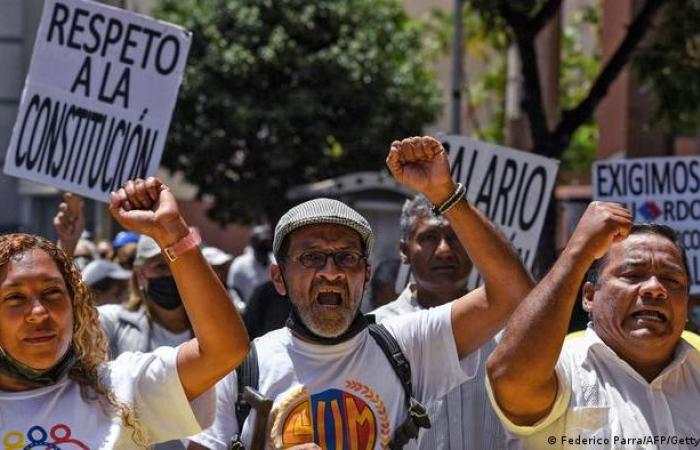Every May’s first the world commemorates the International worker day, a day that honors the dignity of work, the conquest of labor rights and the universal aspiration of a better future. However, in Venezuela this date has become a painful irony: we celebrate the work in a country where working does not guarantee, or live, prosper.
In Venezuela, the official minimum wage is only 130 bolivars monthly, which is equivalent to just over 3 dollars to the official change. It does not even cover 1% of the basic food basket, which, according to independent figures, exceeds 500 dollars. This is not just a cold figure: it is the daily portrait of the suffering of millions.
Carlos, worker from a state -owned company in Guayana, says that he has not received real increases for years: “We work as modern slaves, without insurance, without benefits and with a day arepa.” Mariana, nurse in a hospital in Caracas, says she must sell cakes and make extra shifts as a caregiver to feed her children: “I do not live from my profession, survive despite her.”
Thus, labor poverty has been institutionalized. Working is no longer synonymous with well -being, but of subsistence. The trap of the “standardization of hunger” has been installed, where the salaries of misery are makeup with temporary bonds that have no impact on benefits, pensions or acquired rights. The Venezuelan works knowing that the State explodes it as it pretends to recognize it.
And yet, the Venezuelan has not surrendered. The country’s workforce, despite attacks, remains one of the main resistance symbols. Over the last years, we have seen how workers, nurses, teachers, public employees and retirees have turned to the streets, demanding dignity, salary justice and freedom of association. They are voices that, although they try to be silenced with repression or blackmail, have not stopped roaring.
The exodus of millions of Venezuelans is also a form of protest: a forced diaspora for the need to seek dignity outside our borders. But also within the country, every badly paid working day is a form of rebellion. The fact of continuing to teach, healing, cleaning, building, even if you do not have for the passage, even if there is no lunch at home, it is a clear statement: “They have not managed to break.”
In each Venezuelan home, the empty fridge has become the clearest symbol of the failure of a system that has destroyed the value of work. It is not just the lack of food: it is the daily testimony of wages that are not enough for the most basic, of salaries that, instead of dignifying the worker, condemn him to misery. Thousands of men and women, who day by day fulfill their labor responsibilities, return home empty -handed and the heart loaded with uncertainty. Working in Venezuela, today, is a feat of resistance to the humiliation imposed by those who turned employment into a path to hunger.
This fight is not just economical. It is existential. Because without freedom there is no decent salary, neither autonomous unions, nor collective contracts, nor social justice. The dictatorship has reduced to the worker to a expendable piece within a failed model, but it is the same worker who today feeds the yearning for change.
In each protest, on each strenuous day, in each mother who works three shifts and still finds time to educate their children in values, a different Venezuela is built. A Venezuela where working is again a source of pride, and not humiliation. Where talent and effort are rewarded, not punished.
Today, rather than celebrating, we recognize the courage of those who are still standing. Because behind each worker, teacher, nurse or merchant, there is a struggle. And behind that struggle, there is a hope that does not go out: the hope of freedom.
It is for them, for all of us, that we will continue advancing. Because only in a free Venezuela, work will recover its value and the worker his dignity.
Today, more than ever, May 1 in Venezuela cannot be just a date to remember unfulfilled promises. It is a day to reaffirm that we will not give up, that we will continue to work, resist and dream with a true land of grace, where the honest effort is rewarded and freedom is everyone’s right. Because only conquering freedom, we can build a rich Venezuela not only in resources, but in dignity, in justice and hope. The fridge will fill again, the smiles will return to our homes, and the work will be the pride of a town that never let themselves be overcome.
The Venezuelan works hungry, but fights hungry for freedom! Venezuela will be a land of grace again!
Xiomara Sierra is a lawyer and Venezuelan political leader
Related news
mayo 1, 2025
mayo 1, 2025
mayo 1, 2025
mayo 1, 2025
mayo 1, 2025
mayo 1, 2025
Independent journalism needs the support of its readers to continue and ensure that the awkward news that you do not want you to read, continue to be at your fingertips. Today, with your support, we will continue working hard for a journalism free of censures!
Support El Nacional






